On the trail of the scrap metal crime wave
- Published
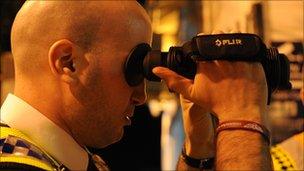
Police used thermal imaging cameras among other tools to spot thieves out on the railway lines
It was a major police operation - over two nights, British Transport Police scoured the West Coast Mainline and Channel Tunnel Rail Link.
They used a helicopter, a specially-adapted "quiet train", thermal imaging equipment, motion detectors, police dogs and motorbikes for Operation Elementary.
The reason? People have been stealing copper signal and power cables, causing havoc on the rail network.
It is just one example of a crime wave plaguing the country - scrap metal theft.
The problem is simple: international metals prices are being driven up and up by the insatiable demand of China and other booming economies.
'Pathetic'
And with the prices for recyclable metal also hitting new highs (see graph), this age-old crime is becoming endemic.
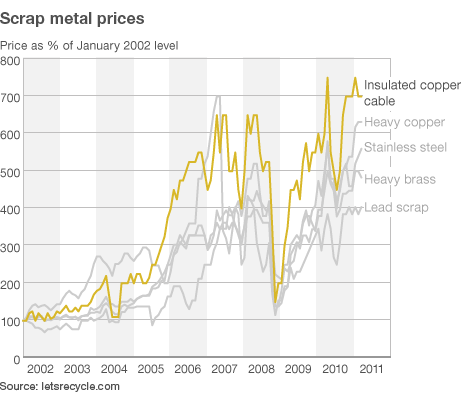
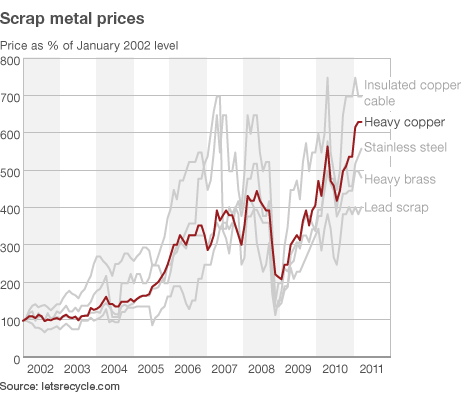
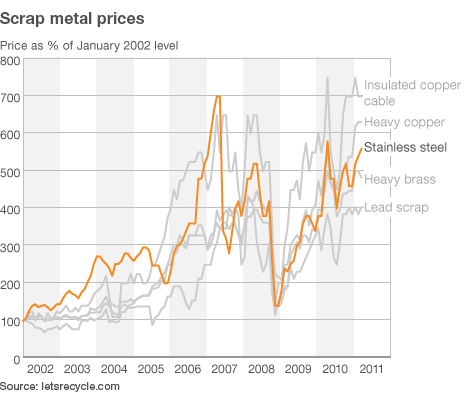
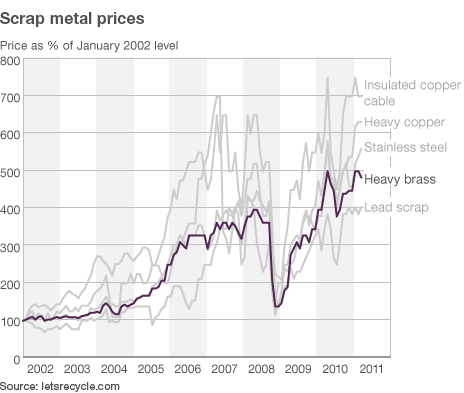
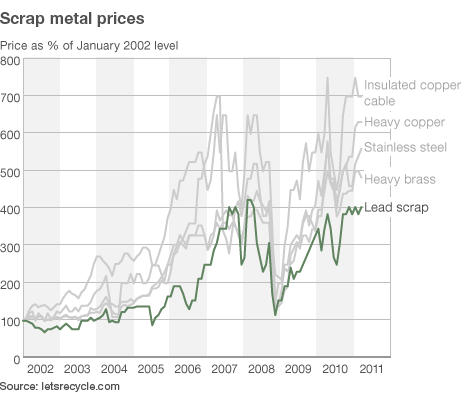
A quarter of Hertfordshire lost its broadband connection last year because of telecoms cable theft.
Thefts from the nation's electricity and gas infrastructure are currently running at double the rate of a year ago, according to Tony Glover of industry group Energy Networks.
"It is pathetic, quite frankly," he says. "As a crime, it is sometimes as little as £5, £10, £20, never more than £100 worth in terms of the value of the copper."
Yet the disruption can be enormous, he says. In one incident the lights went out at 94,000 homes in Kent because someone tried to steal high voltage transmission cables from under a bridge in Dartford.
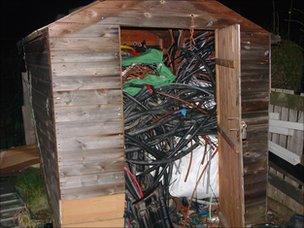
Thieves have been cutting out sections of copper signal and power cables from the railway network
It is a similar story on the railways.
In March, six men were convicted of cutting cabling at sites selected using the internet - their activity caused nearly £1m worth of repair costs and 322 hours of train delays.
The problem took hold on the railways five years ago in parts of Yorkshire long associated with heavy industry and metal scrappage, Network Rail spokesman Rachel Lowe says.
"It's by far the worst region even today," she notes.
But now it has spread across the UK, with Network Rail estimating that the cumulative cost as of late 2010 stood at £35m. In London the Central Line was affected earlier this year and the planned Docklands Light Railway extension has been delayed by repeated thefts from the construction site.
Explosion
The crime can also be dangerous.
Copper gas piping is often stolen from outside houses, causing an explosion in one case last March, and overnight disappearance of manhole covers and road traffic signs are also common.
Moreover, the perpetrators often take suicidal risks themselves - one would-be thief was killed on the railway last year, as were three in separate incidents at electricity substations.
Given the high voltages involved, Mr Glover of Energy Networks says those killed were not so much electrocuted as "burned and blown up".
He worries that they are now going after governor stations - the gas industry's equivalent of substations - offering a "potentially explosive combination" of high pressure gas and electricity cables.
Dangerous habit
All of which begs the question, who would risk their lives for such small gains and with such apparent disregard for the general public?
"In the main, they are very small-scale, amateur," says Mr Glover.
Watch: Thieves make off with stolen copper cable
"These opportunistic thieves often haven't a clue about the dangers they are taking on."
They deliver the stolen metal to scrap yards in the UK which wilfully turn a blind eye. He says some openly advertise themselves as "hear no evil, see no evil, speak no evil" services.
Police say the bulk of this petty crime is driven by drug addiction or other forms of substance abuse.
"These are habitual criminals seeking routine profits to fund a fairly haphazard, itinerant lifestyle," says Superintendent Paul Brogden of the British Transport Police.
The railway thieves convicted last month spent their earnings on drugs and McDonald's.
But there is a growing trend of more sophisticated gangs, Mr Glover says, for example stealing high voltage overhead power cables from the national grid.
Some foreign gangs are thought to be shipping their loot abroad, to be laundered through continental scrap dealers.
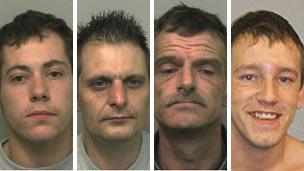
The Derby-based group that used the internet to find targets was one of the more organised gangs
Home-grown criminals are also learning on the job: "Once criminals find a lucrative market, they will refine their tactics over time," notes Superintendent Brogden.
And he says they have been passing their tactics on.
A fraternity of 50 to 60 operators in Essex was originally spawned when a northern gang relocated after their old stamping ground started to be policed more heavily.
Smart moves
So what can be done?
One solution is to replace copper and lead with cheaper alternatives.
The gas industry is switching to steel pipes, while aluminium wiring is coming into use for electricity.
Surrey County Council now replaces missing road signs with plastic ones.
Another technique is to make stolen metal more clearly identifiable, for example by embossing it.
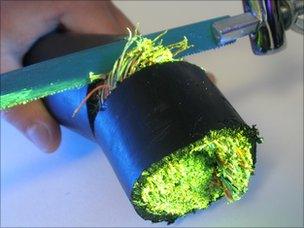
Smartwater glows under an ultraviolet light and contains a chemical code unique to each location
Rail and utility firms are coating critical pieces of metal with Smartwater.
Developed by a UK firm, it is an indelible paint, only visible under ultraviolet light, that contains a chemical code unique to the item being protected.
"The Smartwater brand is very well known to the criminal fraternity," says company spokesman David Reynolds, who claims the product deters thefts.
'Steptoe and Son'
Industries and the police set up a metals theft taskforce last year to share intelligence.
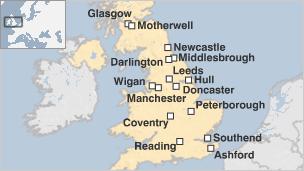
British Transport Police have identified over a dozen hotspots in the UK where cable theft is on the rise
The taskforce is working with the scrap metal industry to help legitimate dealers spot stolen goods.
And it wants to raise public awareness of the crime, something police shied away from before, for fear of encouraging more thefts.
But now - with the crime having gone nationwide - the genie is out of the bottle.
"Perpetrators need to know they are not only putting their own lives at risk, but also entering a very well-policed environment," says Superintendent Brogden.
Yet Mr Glover, who represents the energy industry on the taskforce, is not optimistic.
"We've had three to four years of initiatives based on policing the issue and they have failed," he says.
"The existing legislation is literally out of the age of Steptoe and Son," he says.
The 1964 Scrap Metal Dealers Act gives the police the right to seize stolen metal, but not to shut down dealerships caught receiving it.
The police are pushing for the right to raid dealers without a warrant.
"There are very good lines of communication from certain dealers to the thieves," says Superintendent Brogden.
They also want to ban scrap merchants from paying in cash.
But the scrap metal industry takes a different view.
"Imposing new police powers or restrictions on our members in untimely, unwelcome and will not help to combat the issue of of metal theft," says Ian Hetherington, who heads up the British Metals Recycling Association.
- Published8 April 2011
- Published17 February 2011
- Published25 October 2010